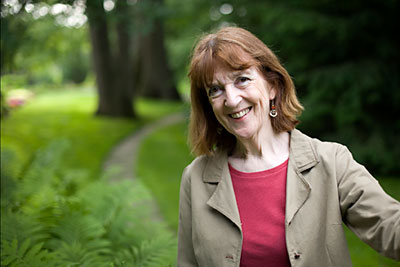Poet Laureate Gail Holst-Warhaft's passions include the harpsichord, hiking and Greece
By Paul Bennetch

There is little in the life of Cornell adjunct professor Gail Holst-Warhaft, Ph.D. '92, that is not deeply rooted in Greece -- its literature, music, poetry and people. After more than 30 years of studying and translating Greek poets ancient and modern, she published her own book of poetry in 2007 that focuses on the Penelope of Greek mythology, and largely as a result of that, was named the Tompkins County poet laureate for 2011.
Holst-Warhaft, an adjunct professor of comparative literature and of biological and environmental engineering, says that her book of poems, "Penelope's Confession" (Cosmos Publishing), is a poetic interpretation of the thought-life of mythical Odysseus' long-suffering wife; the poems offer interwoven strands of commentary on love, loss, politics, greed, gender roles and the power of literature.
How Holst-Warhaft came to write her poems, however, is an odyssey in itself.
Born in Australia, she earned a B.A. in English literature and history of art and studied Baroque harpsichord there before playing the harpsichord in the 1970s for five years in Greece in the musical ensembles of the now legendary composers Mikis Theodorakis and Dionysios Savvopoulos. "Modern Greek music of the type that I was playing was almost exclusively setting poetry to music," said Holst-Warhaft. "It was such a wonderful combination of the best poetry of Greece with wonderfully written music," she said. "It was a revelation."
After writing two books on the subject, Holst-Warhaft came to Cornell to marry Zellman Warhaft, professor of mechanical and aerospace engineering. Before long, she was translating her favorite poets into English as a "labor of love."
"I really loved certain Greek poets who hadn't been translated, and I thought ... 'this is so wonderful I want to share this poet with somebody,'" she said.
Translating poetry, she said, taught her so much about the craft that she decided to try it herself. "Translation was a really good workshop for me, like going to the best creative writing class ever," she said.
It was the advent of the 2003 Gulf War, in particular, that inspired her to put together a thematic collection. The war echoed geographically the Homeric account of the "Western" Greeks who brought their armies to the Trojan "East," with beautiful Helen merely as an excuse for profit-driven war. "It seemed to me an age-old story, of war being fought for reasons that are not what they seem to be," said Holst-Warhaft.
Through the story of Odysseus and Penelope, her book of poems also engaged the theme of absent husbands and waiting wives.
"To me, it's part of grief, this waiting," Holst-Warhaft said. "And I thought of centuries of women who are waiting for their men to come back from war and adventures."
Indeed, grief became a theme in her Cornell doctorate, which was in the field of comparative literature with a focus on Greek and Mediterranean literature, of course. She soon developed a deep personal attachment to the Greek laments for the dead. "I found them so much more powerful than any other poetry I had read on death or mourning," Holst-Warhaft recalled.
Her thesis became her third published work, "Dangerous Voices: Women's Laments and Greek Literature" (Routledge, 1992). After writing another book on the subject, "The Cure for Passion: Grief and Its Political Uses"(Harvard University Press, 2000), she was ready for a change of focus.
Since 2004, she has served as the first director of the Einaudi Center Mediterranean Studies Initiative, which seeks to find solutions to the water crisis in the Mediterranean (starting in Greece) through interdisciplinary approaches.
But the poetry of grief has recently reasserted itself in Holst-Warhaft's work. One personal project that Holst-Warhaft has taken on as poet laureate is to encourage local refugee women to write their stories of nostalgia and suffering in poems. She is collecting these poems and hopes to publish them soon.
Her next collection of poems, however, will focus in part on another love of Holst-Warhaft: walking. Every Saturday and Sunday morning she and her husband "religiously" hike a local trail. "It's become an absolute obsession," she said. "I can't stay out of the woods. … We are surrounded by the most extraordinary beauty."
The new collection will also have sections on ancient Greece and goddesses, family -- and grief and loss, which she says, "underlies everything you do," as one experiences loved ones passing away.
In fine Greek form, Holst-Warhaft embraces writing on the topic. "There's a wonderful lament, which says: 'I'm going to take my grief to the goldsmith and have it made into an amulet to wear around my neck,'" she explains. "And I think that's a healthy attitude to death."
Paul Bennetch '12 is a writer intern for the Cornell Chronicle.
Media Contact
Get Cornell news delivered right to your inbox.
Subscribe